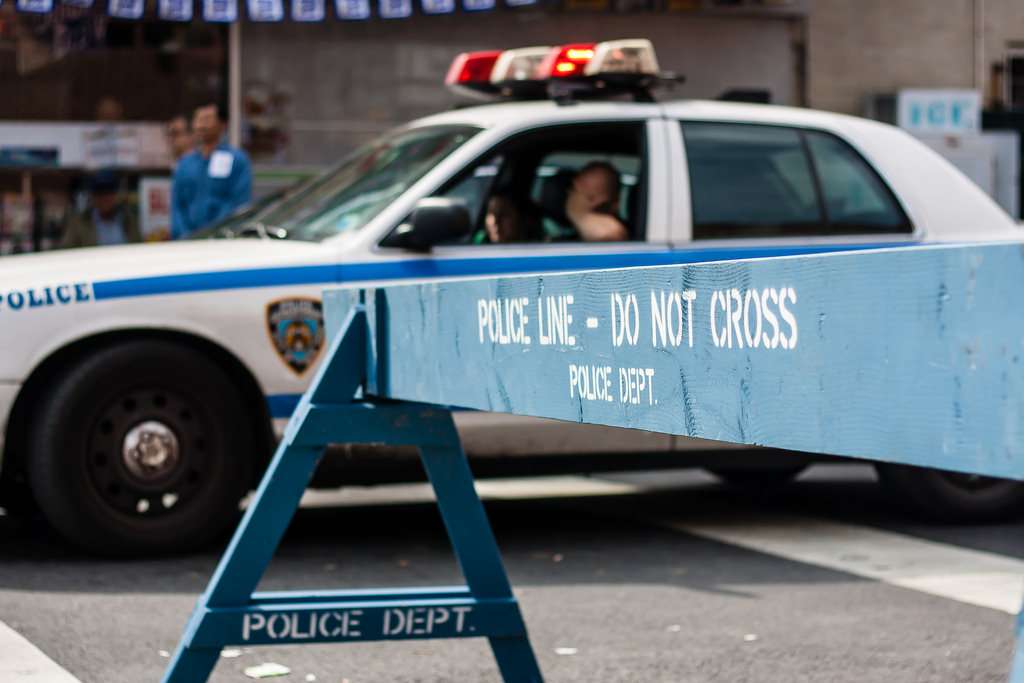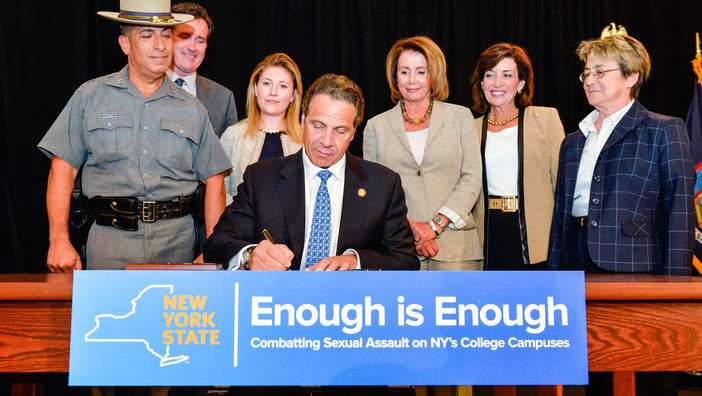New York Creates Special Victim's Unit for Campus Sexual Assault
A step in the right direction?


It's not every day the civil-liberties minded among us cheer for more police involvement in … well, anything. But one facet of a semi-misguided campus sexual assault law in New York could bring better results for student rape victims and students accused of rape by creating a specialized police unit that will train both college administrators and local police departments on best practices in handling sexual assault cases, as well as assist with those cases when appropriate. The initiative is part of a package of efforts to address sexual assault on college campuses that was signed by Gov. Andrew Cuomo in July.
Here at Reason, we've long been advocating for campus sexual assault cases to be handled by regular law enforcement, rather than school administrators. The system of schools arbitrating sexual assault allegations tends to wind up bad for everyone involved. And while victims' advocates often protest that police have historically been terrible at handling rape cases—"Students do not trust state police to respond effectively to reports of gender-based violence," Zoe Ridolfi-Starr, campaign director for sexual-assault advocacy org Carry That Weight, told Reuters—that's a reason to reform police procedures and attitudes, not set up a shadow legal system for those privileged (or unlucky, depending on how you look at it) enough to skip traditional legal avenues.
"There is no question that, historically, issues of sexually-based violence and domestic abuse have not been handled well by law enforcement anywhere in the country," said Christine Quinn, a special adviser to Gov. Cuomo. But that's what the new state unit aims to change. Whether it will be successful is another story, but that seems a lame reason not to at least aim for improvement.
Whether schools should have to report student sexual assault reports to law enforcement is a matter "at the heart of" our national conversation about campus rape and efforts to address it, notes Reuters. A bill in the U.S. Senate, known as the Safe Campus Act, would require colleges to pass on sexual assault allegations to local police. "Under the bill, a student alleging a campus sexual assault may choose to keep the accusation from law enforcement professionals," points out Joe Cohn, legislative and policy director at the Foundation for Individual Rights in Education (FIRE), in The Hill. "But if he or she does so, then institutions may not initiate disciplinary hearings against the accused or provide accommodations like changes in class schedules and dormitory assignments."
Cohn thinks the Safe Campus Act should be changed "to allow non-punitive accommodations to remain available to students who decide not to report accusations to authorities." But he supports the bill more generally, arguing not just that it protects the rights of the accused but also potential future victims of violent students who should be subject to full criminal sanctions. Critics' argument that criminal conviction rates for rape charges are low (so why bother?) "ignores the fact that exactly none of the allegations withheld from police result in jail time," writes Cohn. "It also discounts the possibility that conviction rates would improve by getting accusations to police in a timely manner."

In addition to encouraging more police-campus cooperation in rape investigations, the new New York bill also requires colleges report student sexual assault numbers to the state Education Department, which seems fairly uncontroversial. And it will require "first responders" on campus to notify victims of their right to contact outside police.
Other aspects of New York's "Enough is Enough" law, however, aren't nearly so laudable or harmless. Under the law, all state and private colleges must adopt an affirmative consent standard as official school policy, among other procedures and guidelines regarding campus sexual conduct. The legislation defines "affirmative consent" as "a clear, unambiguous and voluntary agreement to engage in specific sexual activity."
A policy that's spread from California colleges across the country in a year or so's time, affirmative consent is supposed to be a better basis for ensuring mutual agreement in sexual encounters—and maybe it is. But as a legal standard, it sucks.
In a recent case involving a student expelled from the University of Tennessee (UTC) at Chattanooga, Tennessee Chancellor Carol McCoy ruled that requiring the accused to prove affirmative consent, rather than placing the burden of proof on schools to prove the charges against the accused, is a "flawed and untenable" standard. "Mere denial of the accusation is insufficient," she pointed out. "The accused must prove the converse of what is taken as true and credible, i.e., the complainant's statement that no consent was given," even though there are seldom witnesses and the school does no investigating to corroborate allegations (as a police department would do before bringing charges).
"Absent the tape recording of a verbal consent or other independent means to demonstrate that consent was given, the ability of an accused to prove the complaining party's consent strains credulity and is illusory," McCoy continued. "The UTC Chancellor did not make a finding that (the female student bringing the charges) did not consent. Instead, he found (she) recalled very little from the evening. … As noted by the UTC Chancellor, her silence does not constitute 'yes.' By the same reasoning, it does not constitute 'no.'"


Show Comments (43)